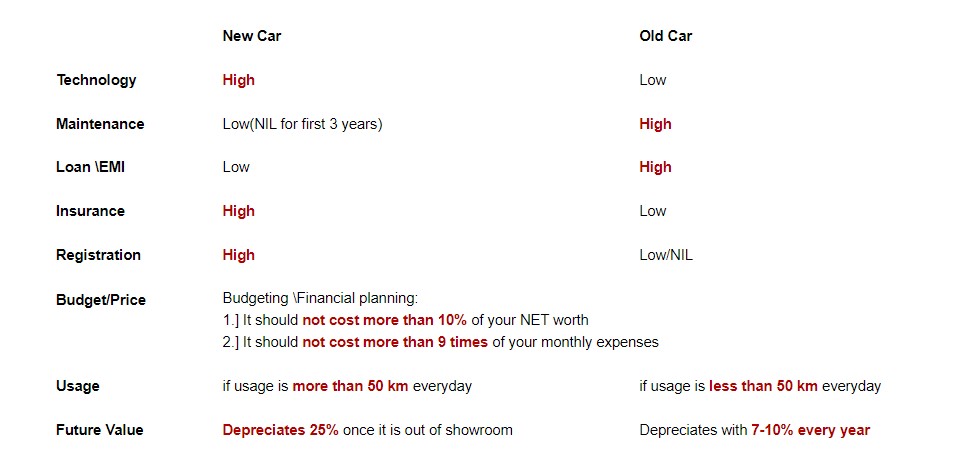Driving Dreams Home: Your Guide to the Ultimate Car Purchase! 🚗
Driving Dreams Home: Your Guide to the Ultimate Car Purchase! 🚗 #BuyingACar #CarShoppingMadeEasy #DreamCarJourney
SELF HELPFINANCE SIMPLIFIED
8/29/20233 min read


Driving Dreams Home: Your Guide to the Ultimate Car Purchase! 🚗 #BuyingACar #CarShoppingMadeEasy #DreamCarJourney
Financial Points to Check Before Buying a Car
Purchasing a car is a significant financial decision that requires careful consideration of various factors. While the allure of a new set of wheels can be exciting, it's crucial to approach car buying with a practical and financially responsible mindset. To make an informed choice that aligns with your budget and long-term financial goals, here are some essential financial points to check before buying a car. Below chart gives a quick glance of positive/negative points one should consider while making a decision .
1. Budgeting and Affordability:
The first step in any major purchase is establishing a budget. Determine how much you can comfortably afford to spend on a car without compromising your overall financial stability. Take into account not only the initial purchase price but also ongoing costs such as insurance, fuel, maintenance, and potential loan payments.
2. Research and Comparison:
Thorough research is key to finding a car that suits your needs and budget. Compare different makes and models, considering factors like fuel efficiency, reliability, safety features, and resale value. Use online resources, consumer reviews, and professional opinions to guide your decision-making process.
3. New vs. Used:
Decide whether a new or used car is a better fit for your budget and preferences. New cars may come with the latest features and warranties, but they also depreciate faster. Used cars can offer better value, but it's important to have a trusted mechanic inspect them for potential issues. Above chart speaks about all the major points on this .
4. Financing Options:
If you're not purchasing the car outright, explore your financing options. Compare interest rates from various lenders, including banks and credit unions. Be aware of the total loan amount, interest rate, monthly payments, and loan term. A higher down payment can also help reduce the overall loan amount and monthly payments.
5. Loan Pre-Approval:
Consider getting pre-approved for a loan before visiting a dealership. This gives you a clear understanding of your budget and strengthens your negotiating position. Additionally, pre-approval can help you avoid high-pressure sales tactics at the dealership.
6. Hidden Costs:
Beyond the sticker price, there are often hidden costs associated with buying a car. Factor in expenses like sales tax, registration fees, documentation fees, and potential add-ons or accessories. These costs can significantly impact the total price you pay.
7. Depreciation and Resale Value:
Understand that cars depreciate in value over time. Research the projected resale value of the specific make and model you're considering. Choosing a car with a strong resale value can save you money in the long run.
8. Insurance Costs:
Car insurance is a necessary expense that varies based on factors like the car's make, model, age, your location, driving history, and coverage options. Get insurance quotes for the cars you're interested in to avoid any surprises in insurance costs after purchase.
9. Fuel Efficiency:
A fuel-efficient car can save you money over the life of the vehicle. Consider the car's miles per gallon (MPG) rating and calculate the potential fuel costs for your typical driving habits.
10. Maintenance and Repairs:
Different cars have varying maintenance and repair costs. Research the typical maintenance schedule and costs associated with the vehicles you're considering. Reliable brands with lower maintenance requirements can lead to long-term savings.
11. Trade-In Value:
If you're trading in your current vehicle, research its trade-in value beforehand. This knowledge empowers you to negotiate a fair deal for your trade-in.
12. Extended Warranties and Additional Coverage:
Dealerships often offer extended warranties or additional coverage packages. Carefully review the terms, coverage, and costs of these options to determine if they align with your needs and budget.
Buying a car involves more than just picking out a model and color. Taking the time to evaluate your financial situation, research various options, and plan for both immediate and long-term costs can help you make a smart and responsible car-buying decision. By being well-informed and financially prudent, you can enjoy your new vehicle without compromising your financial well-being.


